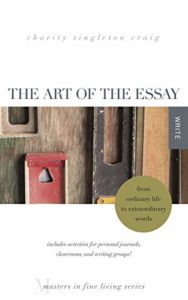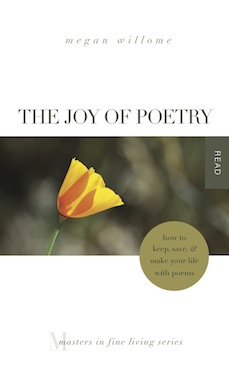[Memory] produces a truth that’s clearer and dearer to us than facts or recordkeeping could ever achieve.”
—Charity Singleton Craig, The Art of the Essay

Each chapter of this book is its own essay. Charity cruises along with the windows down, pointing out this and that, sharing tips, whispering stories. We readers are in the passenger seat, on a very readable ride, with Charity serving as our tour guide to Essayland.
Throughout these first chapters Charity writes about the facts of her life while making an important foundational point: An essay must be the truth. It may include stories, but it’s not fictional. It will involve personal memory, but it will also seek out the memory of others. It will ask questions and receive unexpected answers, even some that contradict the original question. Its organization may require creativity.
And it may mean the essayist needs to own their limitations. One way Charity did that was to include links to a lot of other essays that reflect experiences beyond her own. She also made sure that most of them are available online or perhaps in an anthology easily checked out from a local library. She didn’t want her personal experience to be limiting.
“I live a particular life in a particular place,” Charity told me over the phone. “I wanted the collection of essays to reflect a very wide range of experiences — living and dead authors, men and women authors, authors not in those genders, writers from many countries or nationality backgrounds and ethnicities and races. It’s sort of a tour through essay-writing.”
I wrote a monthly column for the WACOAN magazine for eight years. It was called “Musings,” meaning I could muse my way into an essay about whatever I liked. Often I’d use a memory to write about a greater truth. In 127 Seconds, I used a hike to The Window in Big Bend National Park to talk about grief. I’d made the hike only a couple months before, so the memory was still fresh, but I needed a reason for writing about it since this was an essay and not a travel guide. As with many columns, I had to write a bunch of extraneous stuff before I found the greater truth of what the hike was all about.
Charity told me when she is writing an essay about something sensitive or even heated, the way forward is “to tell the true story of myself.” My story was about more than the truth that I took a scary hike; it was also about the truth of grief, which is its own scary journey. Writing an essay enabled me to find myself.
Write With Us
“It takes a skilled writer to tell what’s true without telling all the facts,” Charity told me.
Chose a specific memory — something brief enough that you could render it in three lines. Write factually, considering the truth of yourself within this memory. Link in the comments.
Photo by Sandrine Néel, Creative Commons, via Flickr. Post by Megan Willome.
Browse more book clubs with Charity Singleton Craig
“Megan Willome’s The Joy of Poetry is not a long book, but it took me longer to read than I expected, because I kept stopping to savor poems and passages, to make note of books mentioned, and to compare Willome’s journey into poetry to my own. The book is many things. An unpretentious, funny, and poignant memoir. A defense of poetry, a response to literature that has touched her life, and a manual on how to write poetry. It’s also the story of a daughter who loses her mother to cancer. The author links these things into a narrative much like that of a novel. I loved this book. As soon as I finished, I began reading it again.”
—David Lee Garrison, author of Playing Bach in the D. C. Metro
- Perspective: The Two, The Only: Calvin and Hobbes - December 16, 2022
- Children’s Book Club: A Very Haunted Christmas - December 9, 2022
- By Heart: ‘The night is darkening round me’ by Emily Brontë - December 2, 2022



Will Willingham says
“It takes a skilled writer to tell what’s true without telling all the facts.” Isn’t *that* the truth. One of the great gifts that writing like this allows, because it is not encumbered by *all* the facts, is that it allows a reader to enter in to it in a more meaningful way. But there’s definitely a skill in knowing what is needed to effectively tell the story and what can be left by the wayside. (And this, I think, also offers a gift to the writer, in this sorting.) So glad for Charity having made this observation, and glad for you to have lifted it out here for us.
Megan Willome says
Thanks, Will, and I heartily agree.
The sorting through all the facts to find the truth is one of the under-discussed aspects of writing. And as a reader, it allows me to consider the truths in my own life that go beyond the facts–to approach the facts as truth-tellers.
Charity Singleton Craig says
Thanks so much for leading this bookclub series, Megan. You’ve done a great job of synthesizing a very challenging part of writing. In fact, I’m so happy you took notes when I was talking … because I don’t think I’d ever articulated some of these ideas quite like this before. Reading them here, along with your perspective, really has me thinking.
One thing I know: sometimes facts get in the way of truth. I just wrote about an incident that happened over the summer that included my mom, my husband, and I, but when I wrote about it, trying to make sure I told the reader that my husband was there too clouded the very important meaning of an encounter between my mom and I. So, I left him out. (I doubt he’ll mind. He’s used to be included or excluded in my writing based on my writerly whims and instincts!) : )
Thanks again. It’s so special that YOU are leading this book club.
Megan Willome says
Thanks, Charity!
You bring up an interesting point, about facts sometimes obscuring the truth. I’ve encountered similar situations. Once I was trying to write an essay about a miscarriage, and I included the detail that the ob/gyn beds were full, so I was put on a wing with cancer patients. Readers immediately thought that meant the doctors suspected I had cancer. Nope. So I dropped the fact in service of the truth.